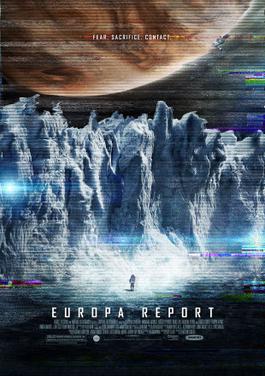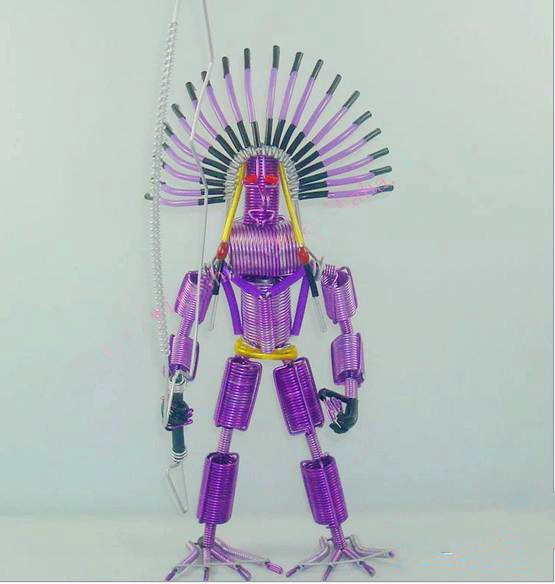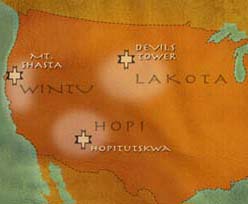I watched the sci-fi thriller
Europa Report recently. Afterward, Facebook friend Brad and I debated its merits. Stick with my review and I'll tie it to my usual Native themes eventually.
** spoiler alert **
Finally watched
Europa Report, Brad. Not spectacular, but solid.
So I liked it more than you? I wouldn't have said it was Oscar material, but compared to most of the sci-fi that's come out in the last several years, I'd say it's near the top.I think you did like it better.
I'd say it was better than movies I didn't care for, such as the two new
Star Treks. On a par with decent movies such as
The Hunger Games. Not as good as the top SF, which would include
Inception and
Chronicle.
I would rank those two ahead of it, yes.Fictional science
I could write a lengthy review of the flaws, both storytelling and scientific, that kept it from being a superior SF movie.
For instance:
Never mind that I doubt we have the capability to pick a good Europan landing site. The astronauts tried to land on top of a thermal vent, chosen for its thin ice or something. Not surprisingly, that proved to be a stupid choice. Gases or something interfered with the landing and blew them off course.
But...they landed a whole 100 meters from where they intended to land. And that was a huge problem that threw off all their plans. Really? After a trip of 500 million miles or whatever, 100 meters was considered a terrible miss? Something they completely failed to anticipate?
I'd guess that landing that close to the spot would be one of the greatest feats of targeting in space history. In comparison, Apollo 11 missed its much closer target by four
miles. Curiosity missed the center of its target range on Mars by 1.5 miles. We've never planned surface landings to the nearest 100 meters and probably never will.
And conducting science within a stone's throw of the vent was almost out of the question? The vent was a hot spot of geological and biological activity, but a mere 100 meters away was a frozen wasteland? That must be the most well-confined hot spot in the solar system.
I would've thought a mile or two from geological activity would be the bare minimum you'd risk for safety's sake. But they wanted to land on top of a site with heat that would and did play havoc with the ice's firmness. Great plan!
Heck, maybe they could land on one of Io's sulfur volcanoes on the way back. I mean
on it, not 100 meters away from it, because that would be too far. You gotta be within inches of a hot spot if you want to do
science!
I didn't think any of that was a huge detractor. As I recall, they didn't know they were only a short distance away from their target. We saw from the ending they would likely have faced even bigger problems had they actually landed where they were supposed to. And the inability to pick an ideal landing site explains away all of that too. They simply ran into much larger problems than they anticipated. It happens.
What I thought was a bigger problem was the way the astronauts kept making "horror-movie" style bad decisions that cost them their lives one-by-one, especially when we learned later that the crash doomed their escape from the beginning. That made the deaths completely unnecessary.
AND where were the robots?! I'm surprised you didn't seize on that! Futuristic space mission and they only had the one probe to drill into the ice--no robots, no rovers, no drones?They knew where they landed. They had a computer graphic showing the exact 100-meter path from their landing site to the vent.
It was
my point that they would've had even bigger problems if they'd landed where they intended. In other words, their primary plan was stupid and ill-conceived. And the entire thrust of the movie was based on this ridiculous plan. That the missed landing led to a slow death rather than a quick one is still evidence of idiocy.
Europa on the cheap
And that was just an example. I noted many other problems. For instance:
They couldn't repair the comm link after a year in space, but after they crash-land, Andrei fixes it in a minute.
The second (crash) landing should've demolished the ship. No way do you lift off again after that. Or even live through it.
The whole first half of the movie was a red herring. James died mysteriously, Andrei was mysteriously depressed and uncommunicative, and the comm link was mysteriously down. An ominous indicator of something terribly wrong with the mission? Nope, just a garden-variety accident and the astronauts were sad. It had no real bearing on the rest of the movie.
Europa's ice is supposed to be 100 km. thick, but I gave them that one. They implied the ice was thin around the vent. And the drill that looked like a simple cylinder could've been one of several super-robotic drills that were specially designed to drill through Europa's ice.
In reality, any mission to Europa for the next couple of centuries will be robotic rather than manned. Unless we invent a cheap warp drive, that is. And yes, any manned mission will make extensive use of probes, robots, rovers, and so forth.
I mean, even Curiosity the Mars rover seems better equipped than this lander. "We can't do anything this far from the vent! Katya has to go there personally and stick her hand into it!
"If only there were some way to send scientific instruments 100 meters away...across the land...without human help. But...that's impossible!"
But I gave them that one because a private company funded the mission. I told myself that the company somehow arranged to profit from having people do the exploring. A billion-dollar PR stunt or something like that.
If you saw the TV series
Defying Gravity, it made a point of talking about corporate sponsors. In our media-saturated future, that's probably the way it would be. ("General Motors Presents the USS Enterprise featuring Coca-Cola Captain James T. Kirk.")
A related problem was how luxurious the lander was. It was bigger than the Enterprise's bridge. It had at least two levels and couches for all six astronauts, even though Andrei was supposed to stay in orbit. "Should we leave Andrei alone? Naw, we got room in our luxury lander for a whole Boy Scout troop. Bring him along."
The spaceship seemed okay, although we never got a real idea of its size. But no way does a corporation invest in such a lavish lander. Or risk it by landing next to an unknown vent on an unknown surface. A compact lander with a rover that landed a mile away would be safer
and more cost-effective.
Acting like horror victims?
Katya was the only one who really wandered off like a horror-movie victim. Daniel and Andrei had to go onto the ice to fix the lander.
I did mind the similarity of the three deaths: alien grabs them through the ice. And I minded the lack of discussion about what was happening.
You've got a possible source of light, heat, and radioactivity directly under the ice. Which, as already noted, is incredibly thin. This source is causing quakes bad enough to rattle the ship.
In those circumstances, how about doing all your tests from the relative safety of the ship? If not the safety of orbit? You've got a
thing under the ice and you're a prime target: a foreign source of light, heat, and radioactivity. Think about it carefully, in detail, and beware!
"They couldn't repair the comm link after a year in space, but after they crash-land, Andrei fixes it in a minute."
I thought that problem was because it would have required another space walk and after the one guy died it's understandable that they would have been iffy on doing that.
"The second (crash) landing should've demolished the ship. No way do you lift off again after that. Or even live through it."
Probably true.
"The whole first half of the movie was a red herring...It had no real bearing on the rest of the movie."
I mostly agree with you there. I think the two purposes it served were to set the stage for the "space is dangerous" premise of the rest of the film. More importantly, it was the means by which they got Andrei down to the surface with no one left on the command ship.
"A related problem was how luxurious the lander was. It was bigger than the Enterprise's bridge."
Again, I think the only reason they had room for Andrei was because James died. I think HE was originally supposed to go down to the surface with the team while Andrei stayed behind.
And it was unrealistically large, sure, but I don't think it was THAT big. It had two levels, yes, but the top one just had room for the pilots. I was guessing it maybe only slightly larger than the cabin of the space shuttle. I would have guessed that the old Enterprise bridge was at least 50 feet across.
Of course some of that has to do with the nature movie making. Sets have to be large accommodate equipment and shooting distance. Defying Gravity was kind of ridiculous that way too--spacious hallways and high ceilings. Of course a real space mission where you have heat that space and burn fuel to push it around, you'd never have that.Communications with earth are too important to forgo. And trained astronauts--the best people from all the space programs--should be the last ones who'd give in to fear.
Besides, if you're depressed over a teammate's death, the last thing you should do is isolate yourself from human contact. This is Psychology 101. "We're totally alone in deep space, so let's wallow in our isolation and
not fix the communications"...
wrong.
And even if you could justify that choice, you need to
justify it. On screen. Like, "We
could fix the communications, but no one wants to risk it. We're all too scared now." That would set up the final fix as more than sloppy storytelling.
I understand that the filmmakers wanted to create a sense of foreboding with the initial red herring. I just disagree with how they did it. The journey to Europa took another
year, which is more than enough time to get over James's death.
And the movie never addressed why they considered Andrei untrustworthy. Because he saw his teammate die? They all saw it. A year ago. Contingency plans. Trained astronauts. Get over it.
I was thinking James might've committed suicide. Because the long trip was making them psychotic, and
that would sabotage the mission. But no, the film didn't take that approach, which would've been better dramatically. The plot and structure were flawed and I noted it.
The luxury lander
The lander had two couches in the upper control module and four more couches in the lower luxury lounge. The mission always allowed for all six astronauts--plus a Boy Scout troop--to go to the surface.
In the reality of space flight, that's never a variable. If you plan for, say, four people to land, the lander has space for four people. Period.
William the Chinese commander died because he fell from the top of the lander to the bottom. Which appeared to be 50 feet or more. So the lander was that tall, and I'd argue it was that wide too.
It's a ridiculous amount of space to have in a lander. All that volume means an insane amount of ship you have to land safely and thrust into orbit again. Even the 1960s
Star Trek understood that a small landing shuttle makes more sense.
Apollo 13 managed to film the story in the tight confines of a realistic spacecraft. I suspect several of the film's choices were made just so the filmmakers could contrive a way to kill everyone. Nobody left in the orbiter? The guy they'd normally leave could be suicidal. Need a way to kill somebody besides falling through the ice? How about a fatal fall within the lander?
And sure, you can come up with explanations for everything. But if audience members even think about potential flaws, it means you've lost their attention. They aren't swept away by the story, haven't suspended their disbelief.
Since most of these errors were fixable, that's subpar storytelling. I don't "geek out" when they get some of the science right. I expect them to get the rest of the science right too.
I think the deal with Andrei was that they were worried he might kill himself if they left him alone. And I thought the general "sadness" of the crew was just from the isolation of being in space that long, especially after their link with Earth went down rather than being about the death.
I don't think it was that tall. It was a pilot cabin with a ladder down to the crew chamber. It didn't look any taller of a climb than say a two-story house to me, maybe about 13 feet from floor to floor. That would still be sufficient to kill you especially if the ship were falling fast enough and you landed on your neck or head. As you pointed out, some of the other seated crew members likely would have been injured or killed in that scenario too.
All in all, your point is taken. A REAL mission probably would have had a small, maybe four-man, lander with room for one pilot, one engineer, and two scientists. And they definitely would have left one of the pilots on the command ship.
MY big in-movie problem was with the behavior of the alien. Unless you assume that this cephalopod-looking creature was sentient, then its behavior was totally illogical. An animal only acts aggressively like that if it's hunting or defending its territory. And such an animal would have only evolved such a behavior if there were other organisms on the surface for it to fear or eat, which both science and the film had already established was impossible.Exploration always good?
Also, speaking from my pseudo-Native perspective, it would've been nice if someone questioned the whole mission. Like, "What if Europa does have intelligent life? Is it totally wise to land on top of their home and stick a probe into their midst? What if they react the way Native Americans did--with understandable hostility to the intrusion? From their perspective, we're invading and contaminating their world, and they may not appreciate it."
Arthur C. Clarke's
2010 implied that message with its "leave Europa alone" ending. These days it's common to talk about the hubris of human space explorers. But "Europa Report" was basically 100% pro-exploration. Its message, which it repeated a couple of times, was "the quest for knowledge is more important than individual lives."
Well, tell that to the Natives who were decimated by European diseases. The quest for knowledge has potential downsides--ape-men learn to kill, computer goes mad--that a smart story would acknowledge.
2010 was a better Europa film because it touched upon these philosophical issues.
Well I certainly would never suggest that this film was up to Clarke's level of writing to begin with. But in this case I don't think the explorers had any belief at all that there was anything more complex than micro-organisms there, if anything. In 2010, the astronauts were given several suggestions that life was out there, some more subtle than others. Certainly the Europa crew had less reason to expect complex life there than Columbus did to expect life on another part of the Earth.Yes, the explorers in
2010 knew about the Monolith. But they didn't know there was life on Europa, initially.
You don't have to know the lesson before the story begins. You make the point by how the story unfolds. Like when you stick a probe with a light into a dark, pristine environment, it triggers a clear reaction. You discuss and learn from that reaction.
Like, "Ohmigod, maybe we shouldn't have put that probe in the water. Maybe we should've conducted a month of tests from orbit. Now we're all gonna
die!"
You have Rosa, the pilot who had a chance to leave her thoughts on video: "Maybe we were too careless, too thoughtless. Maybe there are cases where we shouldn't quest for knowledge. I don't know, but this expedition was flawed from the beginning.
"A corporation sent us here to make a profit, not to advance the human race. A backup communications array was too expensive, they said, so we had to go silent for a year. A rover was too expensive, they said, so we had to land near the vent. The whole mission basically failed because the company was too cheap.
"If Europa Ventures receives this message, it'll get the payback it wanted: enough biological discoveries to start whole new product lines. Let's hope someone other than the shareholders benefit from them. Meanwhile, we'll be dead, and the Europans will consider us hostile invaders. Not exactly a perfect tradeoff.
"This is Rosa the pilot, signing off from my tomb on Europa."
Wow, I just made the ending of
Europa Report ten times better. I pat myself on the back for my writing ability. Good job, Rob!
P.S. See my previous posting about how Hollywood never criticizes the 1%, the powers that be, or the status quo. This would've been a great chance to question the whole American idea of progress--of exploring and searching for knowledge at all costs. Opportunity missed!
























